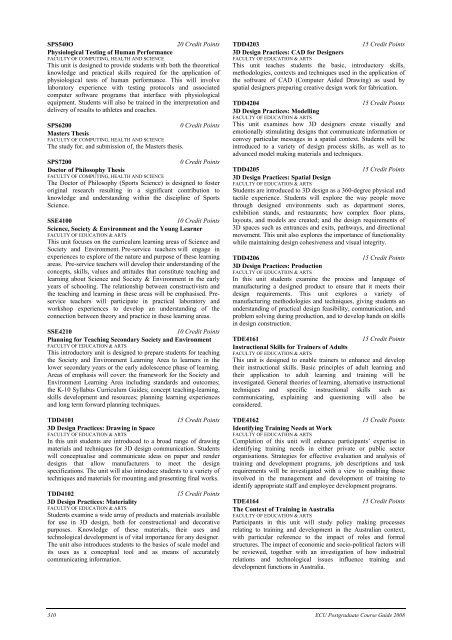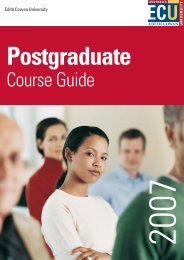Postgraduate - Edith Cowan University
Postgraduate - Edith Cowan University
Postgraduate - Edith Cowan University
Create successful ePaper yourself
Turn your PDF publications into a flip-book with our unique Google optimized e-Paper software.
SPS540O 20 Credit Points<br />
Physiological Testing of Human Performance<br />
FACULTY OF COMPUTING, HEALTH AND SCIENCE<br />
This unit is designed to provide students with both the theoretical<br />
knowledge and practical skills required for the application of<br />
physiological tests of human performance. This will involve<br />
laboratory experience with testing protocols and associated<br />
computer software programs that interface with physiological<br />
equipment. Students will also be trained in the interpretation and<br />
delivery of results to athletes and coaches.<br />
SPS6200 0 Credit Points<br />
Masters Thesis<br />
FACULTY OF COMPUTING, HEALTH AND SCIENCE<br />
The study for, and submission of, the Masters thesis.<br />
SPS7200 0 Credit Points<br />
Doctor of Philosophy Thesis<br />
FACULTY OF COMPUTING, HEALTH AND SCIENCE<br />
The Doctor of Philosophy (Sports Science) is designed to foster<br />
original research resulting in a significant contribution to<br />
knowledge and understanding within the discipline of Sports<br />
Science.<br />
SSE4100 10 Credit Points<br />
Science, Society & Environment and the Young Learner<br />
FACULTY OF EDUCATION & ARTS<br />
This unit focuses on the curriculum learning areas of Science and<br />
Society and Environment. Pre-service teachers will engage in<br />
experiences to explore of the nature and purpose of these learning<br />
areas. Pre-service teachers will develop their understanding of the<br />
concepts, skills, values and attitudes that constitute teaching and<br />
learning about Science and Society & Environment in the early<br />
years of schooling. The relationship between constructivism and<br />
the teaching and learning in these areas will be emphasised. Preservice<br />
teachers will participate in practical laboratory and<br />
workshop experiences to develop an understanding of the<br />
connection between theory and practice in these learning areas.<br />
SSE4210 10 Credit Points<br />
Planning for Teaching Secondary Society and Environment<br />
FACULTY OF EDUCATION & ARTS<br />
This introductory unit is designed to prepare students for teaching<br />
the Society and Environment Learning Area to learners in the<br />
lower secondary years or the early adolescence phase of learning.<br />
Areas of emphasis will cover: the framework for the Society and<br />
Environment Learning Area including standards and outcomes;<br />
the K-10 Syllabus Curriculum Guides; concept teaching-learning,<br />
skills development and resources; planning learning experiences<br />
and long term forward planning techniques.<br />
TDD4101 15 Credit Points<br />
3D Design Practices: Drawing in Space<br />
FACULTY OF EDUCATION & ARTS<br />
In this unit students are introduced to a broad range of drawing<br />
materials and techniques for 3D design communication. Students<br />
will conceptualise and communicate ideas on paper and render<br />
designs that allow manufacturers to meet the design<br />
specifications. The unit will also introduce students to a variety of<br />
techniques and materials for mounting and presenting final works.<br />
TDD4102 15 Credit Points<br />
3D Design Practices: Materiality<br />
FACULTY OF EDUCATION & ARTS<br />
Students examine a wide array of products and materials available<br />
for use in 3D design, both for constructional and decorative<br />
purposes. Knowledge of these materials, their uses and<br />
technological development is of vital importance for any designer.<br />
The unit also introduces students to the basics of scale model and<br />
its uses as a conceptual tool and as means of accurately<br />
communicating information.<br />
TDD4203 15 Credit Points<br />
3D Design Practices: CAD for Designers<br />
FACULTY OF EDUCATION & ARTS<br />
This unit teaches students the basic, introductory skills,<br />
methodologies, contexts and techniques used in the application of<br />
the software of CAD (Computer Aided Drawing) as used by<br />
spatial designers preparing creative design work for fabrication.<br />
TDD4204 15 Credit Points<br />
3D Design Practices: Modelling<br />
FACULTY OF EDUCATION & ARTS<br />
This unit examines how 3D designers create visually and<br />
emotionally stimulating designs that communicate information or<br />
convey particular messages in a spatial context. Students will be<br />
introduced to a variety of design process skills, as well as to<br />
advanced model making materials and techniques.<br />
TDD4205 15 Credit Points<br />
3D Design Practices: Spatial Design<br />
FACULTY OF EDUCATION & ARTS<br />
Students are introduced to 3D design as a 360-degree physical and<br />
tactile experience. Students will explore the way people move<br />
through designed environments such as department stores,<br />
exhibition stands, and restaurants; how complex floor plans,<br />
layouts, and models are created; and the design requirements of<br />
3D spaces such as entrances and exits, pathways, and directional<br />
movement. This unit also explores the importance of functionality<br />
while maintaining design cohesiveness and visual integrity.<br />
TDD4206 15 Credit Points<br />
3D Design Practices: Production<br />
FACULTY OF EDUCATION & ARTS<br />
In this unit students examine the process and language of<br />
manufacturing a designed product to ensure that it meets their<br />
design requirements. This unit explores a variety of<br />
manufacturing methodologies and techniques, giving students an<br />
understanding of practical design feasibility, communication, and<br />
problem solving during production, and to develop hands on skills<br />
in design construction.<br />
TDE4161 15 Credit Points<br />
Instructional Skills for Trainers of Adults<br />
FACULTY OF EDUCATION & ARTS<br />
This unit is designed to enable trainers to enhance and develop<br />
their instructional skills. Basic principles of adult learning and<br />
their application to adult learning and training will be<br />
investigated. General theories of learning, alternative instructional<br />
techniques and specific instructional skills such as<br />
communicating, explaining and questioning will also be<br />
considered.<br />
TDE4162 15 Credit Points<br />
Identifying Training Needs at Work<br />
FACULTY OF EDUCATION & ARTS<br />
Completion of this unit will enhance participants’ expertise in<br />
identifying training needs in either private or public sector<br />
organisations. Strategies for effective evaluation and analysis of<br />
training and development programs, job descriptions and task<br />
requirements will be investigated with a view to enabling those<br />
involved in the management and development of training to<br />
identify appropriate staff and employee development programs.<br />
TDE4164 15 Credit Points<br />
The Context of Training in Australia<br />
FACULTY OF EDUCATION & ARTS<br />
Participants in this unit will study policy making processes<br />
relating to training and development in the Australian context,<br />
with particular reference to the impact of roles and formal<br />
structures. The impact of economic and socio-political factors will<br />
be reviewed, together with an investigation of how industrial<br />
relations and technological issues influence training and<br />
development functions in Australia.<br />
310 ECU <strong>Postgraduate</strong> Course Guide 2008



